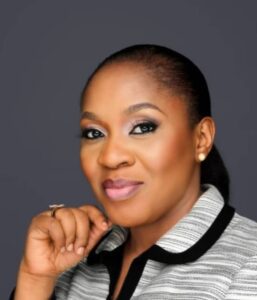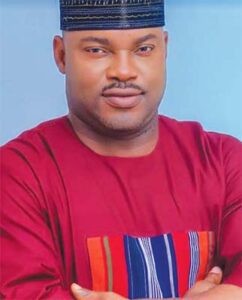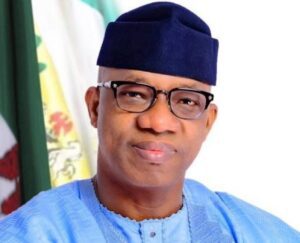
Dele Alake: Knowledge, vision, courage stand Tinubu out
Director of Strategic Communication for the Tinubu/Shettima Presidential Campaign and former Lagos State Commissioner for Information and Strategy Mr Dele Alake was interviewed on a TVC programme, Journalists Hangout,on Tuesday. He spoke on why Asiwaju Tinubu looks good to clinch the presidential race. He was hosted by BabajideOtitoju and Ayo Ozungbaku. Excerpts:
Preparations for the 2023 elections are in top gear and the campaign will start next month. How will you describe the tempo so far from the vibes you are getting?
I think it’s been a natural development. We have seen several election cycles in our time. Personally, there has been nothing spectacularly different from the previous build-up to campaigns that we have witnessed in Nigeria.
Of course, when elections or campaigns are near, passions are bound to erupt and then you see gravitation to the left, to the right and centre and all of that and vituperation of all kinds from all corners.
Of course, it’s natural because it is a competition for power. The election as in any election is a competition for power. Therefore, the various contending interests will be gathering their loins, preparing their arsenal and stockpiling their weapons and stuff like that for the campaign and then the eventual election. The tempo rising, to me, is a natural occurrence. It is something to be expected. I haven’t seen anything outside of the ordinary in the tempo so far
Which factors do you think will shape the 2023 presidential election?
The salient issues confronting Nigeria now are the factors and the variables that will shape the election in 2023. From our side, we are not going to engage in rabble rousing.It is those who believe that they are going to lose or have nothing tangible, or quality product to market to show the public that will engage in rabble rousing or comedic tantrums and stuff like that.
No, that’s not for us.We have a truck full of products to dish out to the discerning public anyway. There is no gainsaying the fact that all the contending personalities in the political firmament of today, our product stands head and shoulder ahead of any other person in terms of track records, in terms of antecedents, in terms of all the attributes of leadership.
He is an embodiment of all the leadership of a progressive developing nation or a nation that is in a hurry to be developed and we have the example. Is it in social engineering?Is it in political development?Is it in infrastructural development? Is it in mental development?In any aspect of administration, public life, human life, human existence, our product, Asiwaju Bola Ahmed Tinubu (BAT), stands ahead of any contender on the horizon as of today.
The factors that are going to shape and condition the minds of the electorate are the salient issues of security, economy and so on. As we go along, we will get to the nitty gritty and unveil so many of the details of his achievements and his vision for Nigeria
The candidate of Labour Party, Peter Obi, is gaining so much popularity on social media, even in the southern part of the country. Do you think this is the year of a third force? You know before, what we used to have predominantly are the APC and the PDP, but Peter Obi moving to the Labour party seems to have changed the narrative for the 2023 election.
I cannot sit down here and deny the fact that there is an amount of groundswell of frustration amongst the youth and among the cross section of the populace, which is actually the driving force behind what you term as the popularity of Peter Obi on social media.
However, I can tell you that it is natural(the feeling, the pent up anger of all of those that are venting their spleen through the symbol of Peter Obi).
The aggravation of all those pent up anger is being channeled toward Peter Obi on social media. However, social media is not going to determine the 2023 elections. It has never determined any election in Nigeria to a large extent and it is not going to determine the 2023 election. Neither is it going to determine our elections in several years to come.
You need to do a critical cold rational analysis of the political behaviour and the political environment in which we are; the political environment of our people.
Now all those people who are regarded as social media warriors or who are active on social media, if you take their population, you will discover that it is not going to sway the larger voters.
For instance, how many of our rural dwellers or farmers are on social media. Why we think social media is such a fuss now is because the elite (like you and I) are on social media.
However, when you aggregate the social media activists’ population, vis-à-vis the entire population of the country, you will discover that it is almost infinitesimal.
Therefore, whoever is basing his/her judgement on 2023 in terms of social media has missed it. We are experienced in this matter. We are not just smoking our fire on social media alone, we are moving on to all strata of the society, which we have always done.
How, let’s go into grade stacks, even amongst those who are on social media, what percentage of them are going to vote at the end of the day? What percentage of them are registered voters?
A large percentage of them are what the Nollywood people call waka pass. They are not committed voters. Statistics and empirical analysis support this.
In addition, those who are gravitating to Peter Obi are not analyzing his antecedents, especially in terms of performance. If that is put into consideration, Peter Obi will trail far behind and this is not in any way to denigrate him. These are facts.
Oh, he has been Governor, but our candidate Asiwaju has also been Governor for eight years. However, in terms of performance, the difference is clear like night and day. There is no basis for comparison.
Therefore, if the people who are emotionally or sentimentally attached to Peter Obi are educated or enlightened and are told to do rational analysis, they would not to make a mistake of their lifetime. They will discover a difference; they will discover that it is fluke and this is substance and our candidate is the substance.
What we need at this point is visioning.
What do we mean by visioning?
I will tell you; a leader must be able to think minimum of 25 years and conceptualize what that will entail for the next 25-30, 40-50 years, not just for today. Cash and Carry container economics people look at immediacy. A visionary leader must look at now, the immediate term, the long term and the next generation and plan accordingly. It is only Asiwaju who has the demonstrable capacity. He has done it, and I will give you an example.
Many people are gravitating to Lagos, the Atlantic City, which is an icon of Nigeria today, was water some years back. Bar beach used to overflow into Ahmadu Bello Way, Victoria Island. At some point, in2000, the entire stretch of Ahmadu Bello was being submerged and the property value in Victoria Island dropped because people are moving out of fear.
In addition, what did the Federal Government at that time do? What were they doing? They were sand filling every year with billions of Naira. I am a witness and so are many.
I was in the cabinet at the time, so I knew exactly the A-Z of the visioning, conceptualization, monitoring and execution that translated into the Eko Atlantic today. Asiwaju Bola Ahmed Tinubu insisted that sand filling would not solve the problem.
We shopped around, calling experts and they brought proposals. First, we went to South Africa, the Netherlands and almost everywhere, especially where there was water problem and ocean surges.
Eventually, Asiwaju maintained that a permanent city should come out of the place and that is what we have there today-Eko Atlantic City.
Today, the United States of America is proposing to build its largest embassy in the world on the same Eko Atlantic, which is a project and investment of about over $500 million. This is aside other investments that are going on at the place.
Let me also talk about the Lekki Free Trade Zone, which Asiwaju also conceptualized in the early days of his administration.
Current Governor of Lagos State Mr.Babajide Sanwo-Oluwas on the entourage that went to China when this policy was being conceptualized. Today, the Zone has become a phenomenal economic hub.
That isthe Asiwaju Midas Touch. If he can translateLagos from a mere N600 million per month IGR state into over N50 billion, then he can do wonders for the country.
Given the complexities of our country, can he replicate the success story that he recorded in Lagos on this bigger scale of Nigeria?
It is even easier, for whoever has the capacity. Nigeria is more endowed than Lagos in terms of human, material and natural resources. This is one of the greatest countries in the world.
For Asiwaju Tinubu to translate what he has done in Lagos into Nigeria is easy because in Lagos, I knew what we went through in terms of conceiving all of those things, in terms of the courage that it took to actually put these public policies, projects and programmes into place.
Now in Nigeria, as a whole, we have resources in every corner, including human resources. What is Asiwaju noted for, if not for the ability or capacity to spot talents. That is a no brainer.
Everybody knows that. Which of the other candidates has that capacity, antecedent or track record? Therefore,it’s easier for Asiwaju to be given a larger canvas as it were.
We had two recent off-season elections, in Ekiti and Osun. The APC won one and lost the other. Given that your preferred presidential candidate is contesting against a battle tested candidate of the PDP, someone that could be described as a serial contestant,do you really think that your candidate has what it takes to defeat an Atiku Abubakar?
The first part of your question concerns the last two elections. I do not see how those ones affect my principal’s ability. In fact, some of us, we just do not deal with hearsays, rumourand stuff like that.
If you go to Osun today and do a random survey on the presidential candidates, you’ll discover that Asiwaju is far ahead of everyone. In addition, you can replicate that in all the other states.
Asiwaju has demonstrated repeatedly his capacity to say something and deliver. Asiwaju is the only one I know in the political firmament of Nigeria today that is a thinker and a performer.
It’s been a while since you served as the Commissioner for Information and Strategy in Bola Tinubu’s administration between 1999 and 2007. What can you tell us about that star-studded team?
That again speaks of the capacity of Asiwaju and his leadership quality. One of the greatest indicators of a good leader is the ability to source the right human materials, and put round pegs in round holes and not only that, you don’t just assemble a team and then throw up your hands;you must drive the team and I can tell you because I have ocular proof.
I was a participant in that cabinet for eight years. I saw the management style of Asiwaju, which is a rare attribute of leadership. This was possible because he has had extensive job experience in the corporate world. He has worked in the US and he has worked in Nigeria and in the corporate environment.
He has dealt with national companies. He has worked with many brilliant people, both within and outside the country,coupled with his own innate talent God gave him



